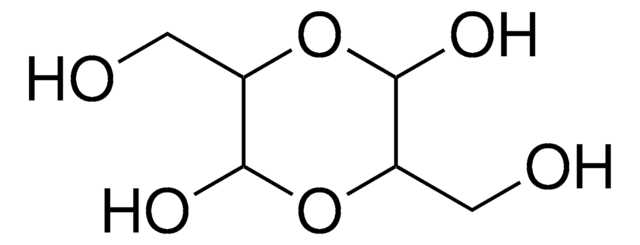49426
DL-Lactaldehyde solution
~1 M in H2O
Sinónimos:
2-Hydroxypropanal solution, 2-Hydroxypropionaldehyde solution
Iniciar sesiónpara Ver la Fijación de precios por contrato y de la organización
About This Item
Fórmula empírica (notación de Hill):
C3H6O2
Número de CAS:
Peso molecular:
74.08
Beilstein/REAXYS Number:
1719827
MDL number:
UNSPSC Code:
12352106
PubChem Substance ID:
NACRES:
NA.25
Productos recomendados
assay
≥95% (TLC)
Quality Level
concentration
~1 M in H2O
storage temp.
−20°C
SMILES string
[H]C(C(O)C)=O
InChI
1S/C3H6O2/c1-3(5)2-4/h2-3,5H,1H3
InChI key
BSABBBMNWQWLLU-UHFFFAOYSA-N
¿Está buscando productos similares? Visita Guía de comparación de productos
Biochem/physiol Actions
D-Lactaldehyde is an intermediate in the pyruvate metabolic pathway. Pyruvaldehyde is irreversibly produced from D-lactaldehyde via the enzyme glyoxylate reductase. L-lactaldehyde is an intermediate metabolite in the pyruvate metabolism pathway and is irreversibly produced from pyruvaldehyde via the enzyme aldehyde reductase, which is then irreversibly converted to propylene glycol via aldehyde reductase.
signalword
Warning
hcodes
Hazard Classifications
Eye Irrit. 2 - Skin Irrit. 2
Storage Class
10 - Combustible liquids
wgk_germany
WGK 3
flash_point_f
Not applicable
flash_point_c
Not applicable
Elija entre una de las versiones más recientes:
¿Ya tiene este producto?
Encuentre la documentación para los productos que ha comprado recientemente en la Biblioteca de documentos.
Los clientes también vieron
Melina Kerou et al.
Proceedings of the National Academy of Sciences of the United States of America, 113(49), E7937-E7946 (2016-11-20)
Ammonia-oxidizing archaea (AOA) are among the most abundant microorganisms and key players in the global nitrogen and carbon cycles. They share a common energy metabolism but represent a heterogeneous group with respect to their environmental distribution and adaptions, growth requirements
Manuela Centanni et al.
Applied and environmental microbiology, 85(7) (2019-01-27)
Infants fed breast milk harbor a gut microbiota in which bifidobacteria are generally predominant. The metabolic interactions of bifidobacterial species need investigation because they may offer insight into the colonization of the gut in early life. Bifidobacterium bifidum ATCC 15696
Lingfeng Zhu et al.
Applied microbiology and biotechnology, 100(3), 1241-1251 (2015-10-12)
The pure stereoisomers of 1,2-propanediol (1,2-PDO) could be used as starting materials to synthesize high value-added specialty chemicals and chiral pharmaceutical products. As the stereoisomers of 1,2-PDO cannot be obtained by traditional chemical synthesis processes, biotechnological processes have gained increasing
Min-Kyu Kwak et al.
Biochimica et biophysica acta, 1862(1), 18-39 (2017-10-12)
High methylglyoxal content disrupts cell physiology, but mammals have scavengers to prevent glycolytic and mitochondrial dysfunctions. In yeast, methylglyoxal accumulation triggers methylglyoxal-oxidizing alcohol dehydrogenase (Adh1) activity. While methylglyoxal reductases and glyoxalases have been well studied in prokaryotes and eukaryotes, experimental
Robert H White et al.
Biochemistry, 45(40), 12366-12379 (2006-10-04)
A biosynthetic pathway is proposed for creating 6-deoxy-5-ketofructose-1-phosphate (DKFP), a precursor sugar for aromatic amino acid biosynthesis in Methanocaldococcus jannaschii. First, two possible routes were investigated to determine if a modified, established biosynthetic pathway could be responsible for generating 6-deoxyhexoses
Nuestro equipo de científicos tiene experiencia en todas las áreas de investigación: Ciencias de la vida, Ciencia de los materiales, Síntesis química, Cromatografía, Analítica y muchas otras.
Póngase en contacto con el Servicio técnico














